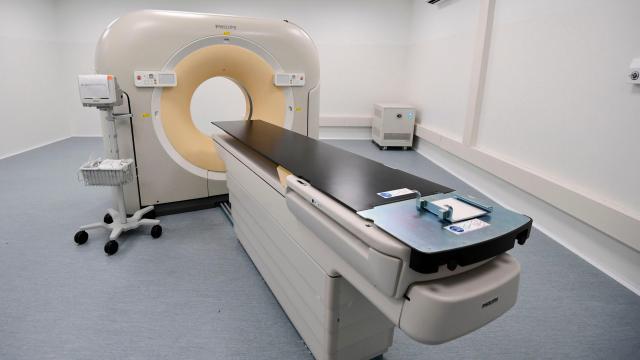A small new study found remarkable improvements in communication and behaviour in three patients with severe Alzheimer’s disease after they received a low-dose radiation treatment. More research will have to be done to confirm these results and to test whether similar benefits could be achieved in people with milder dementia.
In 2016, researchers described the unusual case of an 81-year-old woman with severe Alzheimer’s disease in Canada. The woman was in hospice care, meaning she was expected to have less than six months left to live and was considered largely non-communicative and non-responsive. Soon after she received a computed tomography (CT) scan of her brain, though, her caregiver reported a significant change in her ability to talk, walk, and feed herself again. Her friends and family continued to notice improvements following additional CT scans, and by the end of her scheduled six-month hospice stay, she was functional enough to be sent to a long-term care home. The woman’s condition did eventually worsen, however, and she died in May 2018.
In this new research, which included one of the authors of the 2016 case study, doctors in Canada decided to try the same approach with four more patients living at a long-term care home in Ontario. The patients, who had severe Alzheimer’s but were in stable condition, were each given three treatments of low-dose radiation via CT scan, spaced two weeks apart. The patients were also given tests of their cognition before and after, while close relatives of theirs were interviewed and observed during their interactions with them.
In the objective tests, none of the patients seemed to show concrete improvements in cognition or overall function. But three of the four patients’ families reported seeing real positive changes in their behaviour and ability to talk to them. In one case, the patient’s daughter remarked, “He spoke to me right away and gave me multiple kisses — real kisses like years ago.” In another case, an 82-year-old woman reported feeling grateful for her recovery.
“As in the case report, qualitative data (descriptions, photos, and videos) from immediate relatives and others suggested remarkable improvements in cognition and behaviour,” the authors wrote in their paper, published last month in the Journal of Alzheimer’s Disease.
The authors are careful to frame their research as a pilot study — an early but promising test of a hypothesis. But these aren’t the first researchers to argue that low-dose radiation could become an Alzheimer’s treatment. High doses of radiation are actively toxic to the human body, and relatively low but chronic exposure over time is thought to raise a person’s risk of cancer. But in elderly people with Alzheimer’s, the short-term benefits of low-dose radiation may outweigh any potential long-term risks. In these individuals, it’s possible that low-dose radiation positively stimulates the body’s immune response, reversing or preventing some of the damage caused by chronic neurological ailments like Alzheimer’s. Radiation might also help directly break up deposits of amyloid, one of the two major proteins that builds up in the brains of Alzheimer’s patients.
The next step of this research, the authors say, should be to conduct double-blinded and placebo-controlled trials of low-dose radiation for Alzheimer’s disease, which should also include patients with milder levels of illness.
